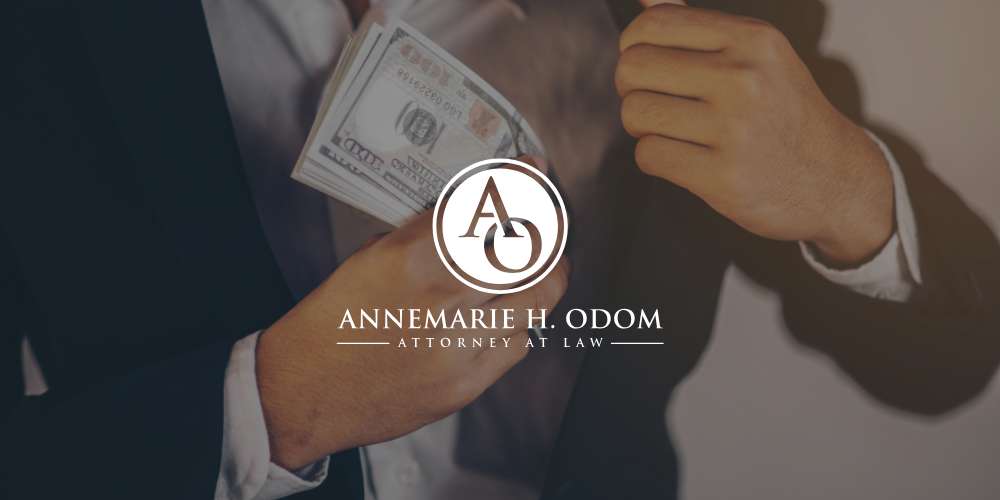Embezzlement Charges
Practice Areas
Greenville, South Carolina Embezzlement Defense Lawyer
Embezzlement is a breach of trust that involves the misappropriation of one party’s property or money by someone else entrusted with the task of managing that money or property. Embezzling money can have serious consequences in the state of South Carolina. That is why, if you’ve been charged with this type of crime, you need the help of an experienced South Carolina embezzlement lawyer like AnneMarie Odom.
AnneMarie Odom is an experienced federal criminal lawyer who will aggressively fight on your side and explore all possible defenses that may help you achieve a favorable outcome in your case. Contact AnneMarie Odom Law immediately to discuss your situation and get straight to work on your defense.

What Does It Mean to Embezzle Money?
When a person commits embezzlement, they are in violation of their fiduciary responsibility. Embezzlement is a type of white-collar crime that occurs when someone misappropriates funds that have been confided to them. Misappropriation occurs when an individual utilizes resources for a reason other than their specific purpose. Annually, businesses lose over $400 billion in embezzled money.
Though embezzlement is technically a type of theft crime, it differs from general theft in that the defendant actually has legal access or ownership over the stolen property beforehand. What this means is that the embezzler obtains the money or other assets legally and, initially, has the authority to possess them. However, when these funds are utilized for unwarranted purposes, often for the perpetrator’s own financial gain, it becomes a crime.
For example, embezzlers may fabricate fake invoices or proofs for actions that did not take place, then spend the funds for personal expenses. In some cases, an embezzler works with a conspirator who is designated as a consultant or contractor on bills. This person makes a profit but never delivers the services for which they are being paid.
Examples of Embezzlement
When embezzlement occurs, it can take many forms. For example, embezzling funds could be as simple as a cashier pocketing a few dollars from the register. However, embezzlement happens on a larger scale in circumstances when top personnel of a large corporation wrongly expend millions of dollars by moving those assets to a place for personal use, such as a bank account. It may also include a person creating fake employees to distribute payroll checks to, and then collecting the money for themselves.
Yet another common example of embezzlement is the use of Ponzi schemes. This occurs when a person pays existing investors with funds obtained from recent investors. Abuse of corporate credit cards and siphoning funds from company accounts are also types of embezzlement.
Is Embezzlement a Federal Crime?
The crime of embezzlement may fall under prosecution at either the state or federal level. To become a federal crime, the act of embezzlement must involve a federal entity and have national interests at stake. For example, if the person who embezzles the money works for a federal agency, this would be tried at the federal level. Similarly, if an individual steals money from a government organization, they too would be tried in federal court and would need the help of an experienced federal crimes attorney.
Definition of Embezzlement in South Carolina
South Carolina Code of Laws §16-13-210 establishes the law for the embezzlement of public funds. According to this statute, it is illegal for a person entrusted to withhold funds to then embezzle these funds.
What Type of Crime is Embezzlement?
The crime of embezzlement is a type of theft that is categorized as “white collar crime.” Many white-collar crimes fall under the umbrella term fraud, which refers to deception in order to earn a financial advantage. However, most of these cases share four key characteristics:
- They are non-violent in nature.
- They are driven by money.
- They involve employee theft from a corporate professional or government official.
- The crime was conducted in part through deception.
Types of White Collar Crime
There are just as many means to perpetrate white-collar crime as there are people who do it. Some of the most common types of white collar crime include:
- Bank Fraud: Bank fraud is a federal offense defined as defrauding financial institutions, such as a bank or credit union, for personal gain. Stealing checks, opening an account with stolen or false information, acquiring loans through deception, and check-kiting are all examples of bank fraud.
- Check Fraud: Check fraud occurs when a person writes checks to a businesses or another individual from an account that does not have enough money to meet the check’s stated amount.
- Counterfeiting: Generally, people associate counterfeiting with the creation and spread of counterfeit currency, although the word also encompasses the creation and sharing of any less expensive replica of a well-known brand or commodity.
- Credit Card Fraud: Credit card fraud is when you steal another’s credit card information and use it to make personal transactions, or when you use a suspended card to make purchases. Identity theft typically involves a significant amount of credit card fraud.
- Embezzlement: Theft of funds from a workplace or a partner in a position of trust is referred to as embezzlement. This might include taking actual money or making fraudulent transactions with an employer’s card.
- Extortion: Extortion, or blackmail under South Carolina law, is the practice of obtaining something through actual or threatened force, intimidation, or violence to gain money or property
- Insider Trading: Insider trading is a sort of securities fraud that includes unlawfully leveraging private knowledge for financial gains, such as selling one’s shares in a firm right before unfavorable information is revealed that would lower the stock’s value.
- Mail Fraud: Because it involved a federal agency, mail fraud is always categorized as a federal offense, unlike many other forms of fraud which can vary in severity. This entails committing fraud through physical mail, such as USPS, and private carriers such as FedEx or UPS.
- Misinformation Securities Fraud: If a business’s owners or managers willfully obscure information in order to attract new or greater investors, this may be considered misinformation securities fraud. Inflating profit margins, falsifying facts about recent occurrences in the firm, or distorting loss declarations are all common examples.
- Money Laundering: Laundering money entails obtaining money unlawfully, such as via drug trafficking, and subsequently taking steps to make the assets appear to have been gained through legal methods.
- Tax Evasion: Tax evasion is defined as any effort to cheat the government of taxes that you would normally pay. Misrepresenting tax returns, transferring property to dodge taxes, and underestimating income on documents are all forms of tax fraud.
- Wire Fraud: Wire fraud entails the commission of a theft crime through use of a telephone, the internet, or other cross-state communication methods. Elderly-targeted phone scams or phishing emails that aim to steal your personal information are both examples of wire fraud.
Statute of Limitations for Embezzlement in South Carolina
Almost every legal action has a deadline for filing a case. State statutes of limitations specify the time constraint for filing a civil lawsuit and restrict prosecuting for the execution of a crime after a certain length of time has passed (in criminal cases). South Carolina, unlike most other states, does not have a statute of limitations on criminal cases, which means that prosecutors can pursue legal action at any point once the criminal offense has occurred.
Federal Embezzlement Statute of Limitations
However, for federal criminal charges of embezzlement, a statute of limitations still applies. Under federal law, nobody can be prosecuted, tried, or penalized by federal prosecutors for a non-capital offense until an indictment is found or information is filed inside of five years of the offense being committed, according to 18 U.S.C 3282.
What is the Penalty for Embezzlement in Greenville, SC?
Crimes of embezzlement differ in severity, and the criminal penalties tend to fit the extent of the crime. Under state law, the penalties for embezzlement in South Carolina are as follows:
- If the value of the embezzled funds is more than $10,000, the individual is fined a proportional value by the court and faces up to 10 years in prison.
- If the value of the embezzled funds is less than $10,000, the individual is fined a proportional value by the court and faces up to 5 years in prison.
In addition to steep prison sentences and other harsh penalties, the defendant typically must also pay restitution to the victim(s), and the offense will appear on their permanent criminal record. This record will appear on future background checks and can make it significantly harder to obtain employment, housing, loans, and more. An experienced Greenville white-collar crime attorney like AnneMarie Odom can help explain the penalties you face while curating a strategic defense against them.
Federal Embezzlement Punishment
Federal embezzlement is still punished depending on the value of assets stolen, but punishments are more extreme. If an individual embezzles under $1,000 worth of federal assets, they face a maximum fine of $100,000 and up to a year in jail. If an individual embezzles more than $1,000 worth of federal assets, they face a maximum fine of $250,000 or a fine equivalent to the value of the embezzled funds if it is greater than $250,000. They also face up to 10 years in federal prison.
Why Do I Need an Embezzlement Lawyer?
An allegation of embezzlement isn’t necessarily black-and-white. The prosecution must prove embezzlement by providing evidence of criminal intent, meaning you intended to permanently deprive the victim of the property embezzled. It is imperative that those accused or charged with embezzlement of money or property seek the help of a skilled criminal defense lawyer.
A criminal lawyer can educate you on the legalities of your case while building a strong defense to prove your innocence. The legal defense prepared by your attorney can make all the difference between facing jail time or not, as well as preserve your image and help restore your reputation.
Call Greenville Embezzlement Defense Attorney AnneMarie Odom Today
If you’re facing embezzlement charges, you undoubtedly have a lot of questions and worries regarding your situation. The best thing you can do for yourself at this time is to consult a legal professional with experience in embezzlement charges and white collar crimes. At AnneMarie Odom Law, we are familiar with the many complexities of both state and federal embezzlement cases, and we know what it takes to build a strong defense for our clients who have been charged with such a crime. Whether it is a case dismissal, a charge reduction, an acquittal at trial, or a reduction in fines, AnneMarie Odom will do whatever it takes to achieve the best possible outcome for your case.
Call (864) 775-5833 right away or fill out our online intake form here for a free consultation with a top Greenville embezzlement defense lawyer at AnneMarie Odom Law.

At AnneMarie Odom Law, we are prepared to help you or your loved one plan a successful embezzlement defense strategy. Call (864) 775-5833 today to schedule a free consultation to go over your legal options, or simply fill out our online intake form to get started.
— OR —